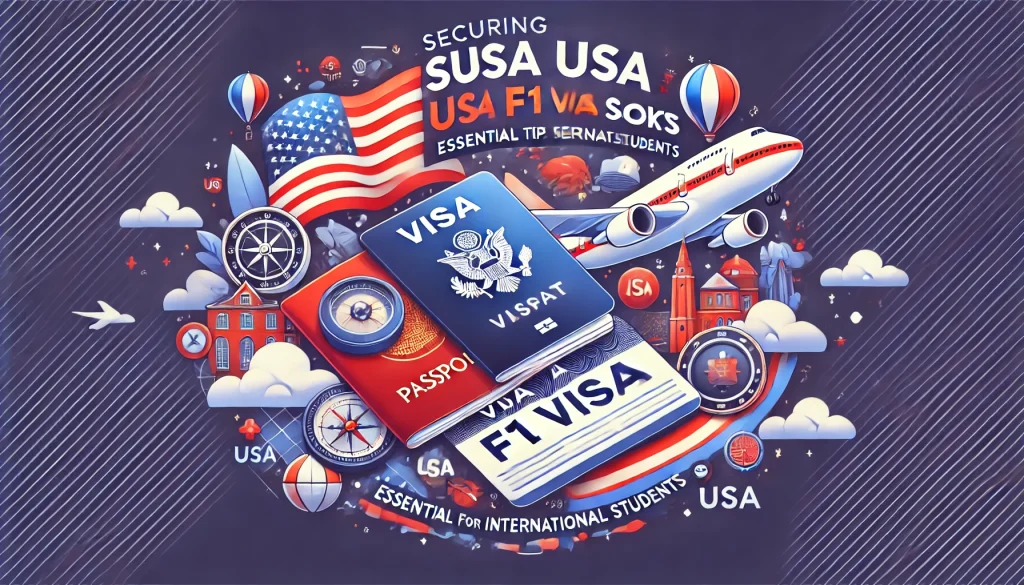
Getting Started with the F1 Visa Process: A Complete Guide The F1 visa is a non-immigrant student visa that enables foreign students to study in the United States. For prospective students who want to study in the United States, it is essential to comprehend the F1 visa procedure. S.
This particular visa is intended for students who are enrolled in academic or English language programs at a U.S. S. an organization. In order to apply for an F1 visa, one must first be accepted into a school that has been approved by the Student and Exchange Visitor Program (SEVP). A Form I-20, which is necessary for the visa application, is given to students upon acceptance.
This document details the course of study, length of time, and financial requirements in addition to confirming the student’s acceptance. Completing the DS-160 form, paying the SEVIS fee, and setting up a visa interview at a U are all steps in the F1 visa application process. S. . embassy or consulate. Each of these procedures necessitates close attention to detail & following particular rules. An essential part of the procedure is the visa interview, which enables consular officials to evaluate the applicant’s qualifications and intentions.
Being aware of the subtleties of this procedure can greatly increase a student’s chances of receiving the F1 visa, so being prepared and knowledgeable is crucial. An essential first step in obtaining an F1 visa is preparing for the visa interview. It is crucial to go into this phase well-prepared and knowing exactly what to anticipate. Inquiries concerning the applicant’s educational background, study plans, and intentions in the United States will be made by the consular officer during the normally five to ten minute interview.
Students should study typical interview questions and rehearse their answers in order to be well-prepared. This preparation increases confidence during the actual interview in addition to assisting with clear thought expression. Students should get acquainted with the U in addition to practicing their answers. S.
system of education and the subject they have chosen. A sincere interest in and dedication to their education can be shown by being able to explain why they selected a specific program or institution. Also, candidates should be prepared to describe how their studies in the U.S. S.
Complement their long-term professional objectives. This degree of readiness can have a big influence on how the consular officer interprets the applicant’s motivations, so it’s important to tell a compelling story during the interview. Supporting documentation is necessary. A valid passport, recent passport-sized photos, and evidence of payment for the SEVIS fee are among the additional supporting documentation that applicants must gather in addition to the Form I-20.
Every one of these documents is essential to proving one’s eligibility for the F1 visa. Extra Files to Support the Application. Students should also prepare any other supporting documentation that could help their application. Academic transcripts, results from standardized tests (like the TOEFL or GRE), and recommendation letters from instructors or professors are examples of this.
These records may offer more proof of the applicant’s aptitude for learning and dedication to their studies. Preparing the Interview Documents. To show the consular officer that you are prepared and professional, it is best to arrange these documents in a folder so that they are easily accessible during the interview.
An essential step in the F1 visa application process is proving your financial stability. The U. S. The government demands that foreign students demonstrate they have enough money to pay for both their tuition & living expenses while they are enrolled in classes.
The purpose of this requirement is to guarantee that students are able to sustain themselves without turning to illegal work or government aid. Applicants must submit financial documentation outlining their funding sources in order to satisfy this requirement. Bank statements, sponsorship or family support affidavits, scholarship letters, and parental or guardian income proof are examples of common financial evidence. These records must be up-to-date and appropriately reflect the available funds. Also, students should be ready to discuss their financial status and how they intend to handle their costs while studying in the United States during the visa interview.
S. Not only does a well-crafted financial plan meet visa requirements, it also gives consular officials confidence that the applicant can succeed academically without facing financial hardship. Successfully obtaining an F1 visa during the visa interview depends on effective communication.
Consular officials are taught to evaluate candidates based on their answers, mannerisms, and general communication clarity. As such, applicants must be able to confidently & clearly express their ideas. In order to improve their communication skills and make sure they express their ideas clearly, students can practice answering frequently asked questions.
During an interview, nonverbal clues are just as important as spoken communication in determining how candidates are viewed. Maintaining eye contact, exhibiting a positive attitude, and using appropriate body language can all improve an applicant’s presentation. Throughout the interview process, students should maintain their composure because anxiety can make it difficult to communicate effectively. Through meticulous preparation & practice of both verbal and nonverbal communication techniques, candidates can greatly increase their likelihood of impressing consular officials.
A positive impression during the F1 visa application process requires an understanding of visa interview etiquette. It is important to make a good first impression in any formal situation, including visa interviews. Candidates should project a sense of seriousness about their academic goals in the US by dressing professionally and keeping themselves well-groomed. In addition to showing consideration for the consular officer, appropriate clothing also shows that the applicant appreciates the chance.
Being on time is also essential when going to a visa interview. An applicant who arrives on time demonstrates organization and responsibility while also demonstrating respect for the officer’s schedule. In the actual interview, candidates should pay close attention to the questions asked & then consider their answers carefully rather than jumping right in. Also, even when confronted with difficult or unexpected questions, it is best to maintain your composure and courtesy throughout the exchange.
An applicant’s chances of getting an F1 visa can be greatly increased by following these etiquette rules. Typical Mistakes to Avoid. Applying for an F1 visa can be difficult, so it’s important to be well-prepared to avoid any problems. Giving false or inadequate information on application forms or in interviews is a common error made by applicants.
This may cause irregularities or disparities that give consular officials cause for concern, which could lead to application processing delays or rejections. Guaranteeing Precision and Uniformity. Before submitting, applicants must carefully check their application forms for accuracy in order to prevent these problems. Also, they have to make sure that all of the data matches the supporting documentation. This focus on detail can help avoid needless hold-ups or difficulties during the application process.
Answering Questions Regarding Home Country Ties. Applicants may also encounter difficulties in resolving issues pertaining to their national connections. Consular officials frequently seek proof that applicants plan to return home after finishing their studies in the US because this satisfies the requirements for non-immigrant intent.
Students should be ready to talk about their ties to their home country, such as family, employment opportunities, or property ownership, in order to allay worries about possible overstay or immigration infractions. When applying for an F1 visa, it can be very helpful to seek professional help. Speaking with immigration lawyers or educational advisors who focus on student visas is beneficial for many students. These experts can offer individualized advice based on each applicant’s unique situation, assisting them in successfully navigating intricate rules & specifications.
To make sure that students are ready for every step of the application process, they can also help with document preparation and interview practice. Also, numerous educational establishments provide services like international student offices that offer assistance all the way through the visa application process. These offices frequently conduct mock interviews, host workshops on visa procedures, & provide guidance on necessary documentation. By using these resources, an applicant’s comprehension of the F1 visa application process can be greatly improved, and it can also offer comfort during what can be a trying time.
The F1 visa application process is a crucial step for foreign students who want to study in the US. Understanding every element will help students confidently traverse this challenging path, from interview preparation to proving their financial stability. The following crucial tactics can help you successfully obtain an F1 visa: being well-prepared, communicating effectively, following protocol, and getting professional advice.
Prospective students can enhance their educational experiences in one of the most diverse learning environments in the world while realizing their academic goals with thorough preparation and commitment.




